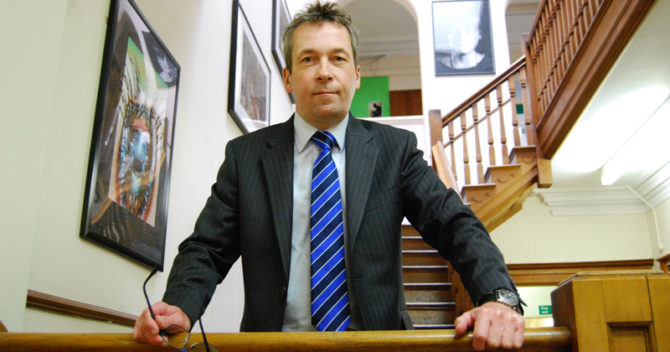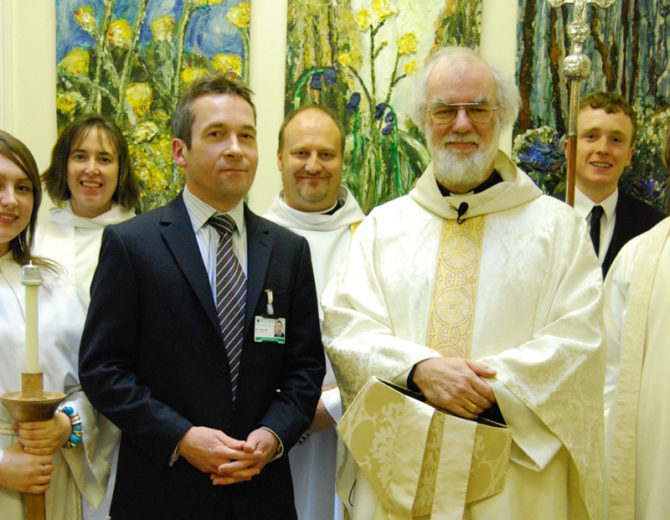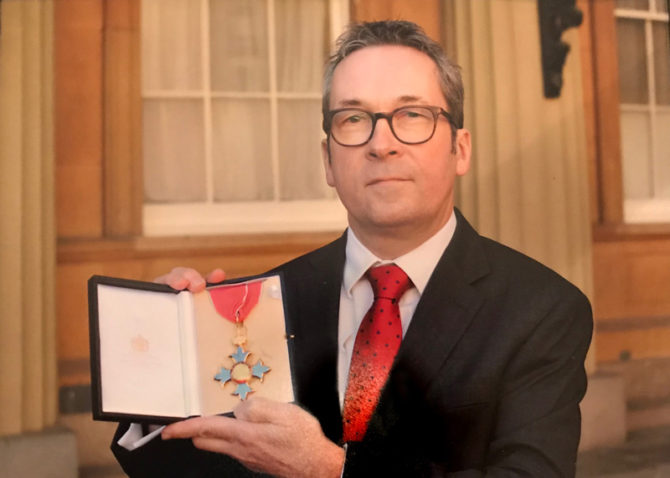Ian Bauckham is probably one of the few people to have talked explicitly about sex with Department for Education officials. As their relationships and sex education adviser for the new guidance, the multi-academy trust chief executive soon realised that someone had to break the ice, and it would have to be him.
“I’m probably one of the few people who has used explicit sex-related terminology with most senior officials,” he confesses over tea in a temporary classroom at Bishop Chavasse, the Church of England free school in Tonbridge, Kent, that’s the latest addition to his eight-school Tenax trust. “There was the odd slightly surreal moment around that, yes. Not the sort of conversation that happens every day.”
I never dare ask what the background is, I just say yes or no
Bauckham is on the boards of Ofqual and the National Foundation for Educational Research and in 2017 received a CBE for services to education. The sex education panel was the fourth in a line of high-profile reviews that he has sat on, starting with the headteacher standards review group in 2014. In fact it’s becoming a bit of a joke among those who monitor these things, that if there’s a government review, Bauckham’s name will pop up. Sure enough, two days after we speak, it’s announced that he will lead Damian Hinds’s latest scheme to develop character benchmarks for schools.
So what has propelled him to such lofty status? “You never really know why you’re invited to do things in the DfE, it just kind of happens,” he says. “You get a phone call, ‘We’ve been wondering if you’d be interested in…’ I never dare ask what the background is, I just say yes or no.”

His relationship with Michael Gove, the former education secretary, might be a factor.
When they first met in 2014, Bauckham was a headteacher in Kent. Over three decades, he’d worked his way up the standard school progression route from modern foreign languages teacher to head of department, deputy head, then headship of Bennett Memorial Diocesan School, a non-selective CofE secondary (which joined with various local primaries in 2015 to form Tenax).
In 2013 he was elected president of the Association of School and College Leaders (ASCL), a one-year position. It was the last year of Gove’s tenure and Bauckham remembers making his conference speech in front of 1,200 people, with Gove and Michael Wilshaw, the former head of Ofsted, eyeballing him from the front row. “So, no pressure! Apart from being a headteacher locally and doing a bit of stuff for ASCL, a bit of networking, DfE, Ofsted and so on, that was my first I’m-going-to-be-noticed moment.”
Noticed he was. As a result of the speech, he built a relationship with the education secretary – even persuading him to open a new building at his school. “He was utterly courteous and interested. He was a very good guest to have.”
The invitation from the DfE came shortly after.

Bauckham is quietly building the kind of CV that sets up a person for a role on the national education scene, but he won’t be drawn on his ambitions. He’s not looking to get into policy – “not directly at the moment” – and when I mention rumours he could be a future chief inspector, he says: “People have all sorts of thoughts don’t they?”
He’s evasive when I ask how much the DfE set the direction for the sex education guidance – and whether he was picked because his views aligned with the department. “I wouldn’t say that the government had a very well-developed plan for sex ed. It had some amorphous ideas around the importance of bringing the 2000 guidance up to date, which was a really important thing to do.” Two major missing areas were LGBT education – since section 28 was repealed in 2003 – and social media.
From late autumn 2017 to spring 2018, he chaired about 30 roundtables with the department and a range of stakeholders. The topics may have been divisive, but there were “no shouting matches – barely, to be honest, even strongly-worded disagreements. Generally speaking, when you have experts in the field clearly articulating their views and perspectives, they’re eminently reasonable. Obviously when you translate that into a soundbite for the media, the story can be a bit different.”

He’s prickly when I ask if he’s getting too close to the government. “What does ‘too close to government’ mean? I’m my own person, I won’t do anything that would compromise my fundamental beliefs and if somebody wants to use my expertise as a teacher and a school leader to improve the system across the country, then I’m happy to do that.”
Bauckham’s traditionalist pedigree made him a natural recruit to the Gove camp – and it’s something that can be traced back to his earliest school days in the 1960s, when he struggled with reading. “I can remember as a child my mother saying, ‘It’s these stupid new methods, how are you supposed to learn to read just by looking at a card? Sit down, I’m going to teach you to sound it out.’ Maybe it was that that went in on some subliminal level.”
His mother had no specialist knowledge; she left school at 14 and worked as a typist all her life. But a desire to help her son to read prompted her to take evening classes to start accumulating O-levels. In her mid-forties she qualified as a teacher of office and computer studies.
Bauckham’s parents both survived the Blitz in London’s East End, and moved to the outer London borough of Havering, on the border with Essex, to raise their family.
“Like many of that generation they were very hungry to improve themselves, although both left school with very few qualifications. My father was an apprentice plumber in the days when apprenticeships were proper things.”
Bauckham was the first in his family to go to university, winning a bursary to study modern languages at Cambridge.
Seven years earlier he’d failed his 11-plus, but it was 1973 when the move to comprehensives was sweeping the country and he got into the local grammar anyway. It was here that he saw the gradual shift to what’s commonly known as “progressive” educational pedagogy.
“I can remember it in languages clearly. We had a very good old-school teacher who taught us the grammatical structure of French properly, sequentially from the beginning, and insisted that we practise to the point of automaticity – my French became very good, very quickly. Later on we had a newer, younger teacher who had been trained differently, and who exposed us to texts that we hadn’t been equipped for, asking us to guess the meaning of words and grammatical structures based on the context.”
It was the traditional teacher who coached him to apply for Cambridge.
After university, Bauckham did a PGCE in Nottingham, which involved a lot of “learning about Piaget and assorted misconceptions about teaching as I now understand them”, before landing a job at a school in Brighton.
One of the highlights of his early career was six months teaching English in the former German Democratic Republic after the Berlin Wall came down. The Russian teachers had become redundant overnight and they needed to retrain.

He stayed in a teacher’s grandmother’s apartment. “She’d recently died. It was a state apartment. He said, ‘The state’s in such chaos, I just won’t tell them that she’s died. You can just live there.’ The GDR was falling apart. It was an eye-opener and just amazing to be there at that pivotal point in the country’s history.”
He spent the next year in Madrid, learning Spanish, then was appointed head of languages at Kingsbury High School, a large inner-London comprehensive where French, German, Spanish and Gujarati were taught.
As he grew in confidence he felt able to drop the progressive pedagogy he’d been taught during his PGCE and return to more traditional language-teaching methods. He’s adamant there should be a preferred sequencing of information, and “absolute focus on the knowledge to be imparted, absolute focus on the words, the grammar, the pronunciation.
“People characterise it as going back to the 1950s, a sort of Gradgrind approach, but that’s a totally misleading caricature.”
This approach strongly informed the Teaching Schools Council’s modern foreign languages standards he produced as chair in 2016-17.
It’s easy to get the impression that he enjoys the complexity of policy-making, despite its frustrations. “When you’re a headteacher you are used to listening to debate and then basically getting your own way,” he says. “When you’re on a DfE panel with other headteachers you are listened to very politely, but you don’t necessarily get your own way because there’s a political landscape to navigate, and competing interests to balance.”
As we climb metal stairs to view the new school’s building, with its big muddy patch that will become the early years’ play area, he dodges a request for a photograph, redirecting the conversation to something more comfortable – how the floor-to-ceiling windows will harness the best of the natural light for the children.
I’m not British Home Stores. I’m running a small group of schools
As top dog at the Tenax, he sees himself very much as an educator, not a business person, and he’s growing increasingly uncomfortable with the title of chief executive.
“It’s not great. I find it really unattractive, just like I find the word ‘MAT’ a bit toxic. Certainly the word ‘chain’ I never use. I’m not British Home Stores. I’m running a small group of schools. This is a trust, a trust in the sense that we are holding in trust the education of children for communities.”
CV
2018-present Board member, Ofqual
2017-present Education adviser on sex and relationships education, Department for Education
2016-present Chief executive, Tenax Schools Trust
2015-present Board member, National Foundation for Educational Research
2016–17 Member of the National Professional Qualifications review panel, National College for Teaching and Leadership
2016–17 Leader of the national review of modern languages pedagogy, Teaching Schools Council
2014–17 Member of the headteacher board for the south east and south London
2014–15 Member, headteacher standards review group, Department for Education
2013–14 President, Association of School and College Leaders
2004–17 Head, then executive head, Bennett Memorial Diocesan School
2001–04 Deputy head, Bennett Memorial Diocesan School
1996–2001 Head of sixth form, Bennett Memorial Diocesan School
1991–96 Head of languages, Kingsbury High School
1985–1990 MFL teacher, Cardinal Newman Catholic School, Hove














Your thoughts